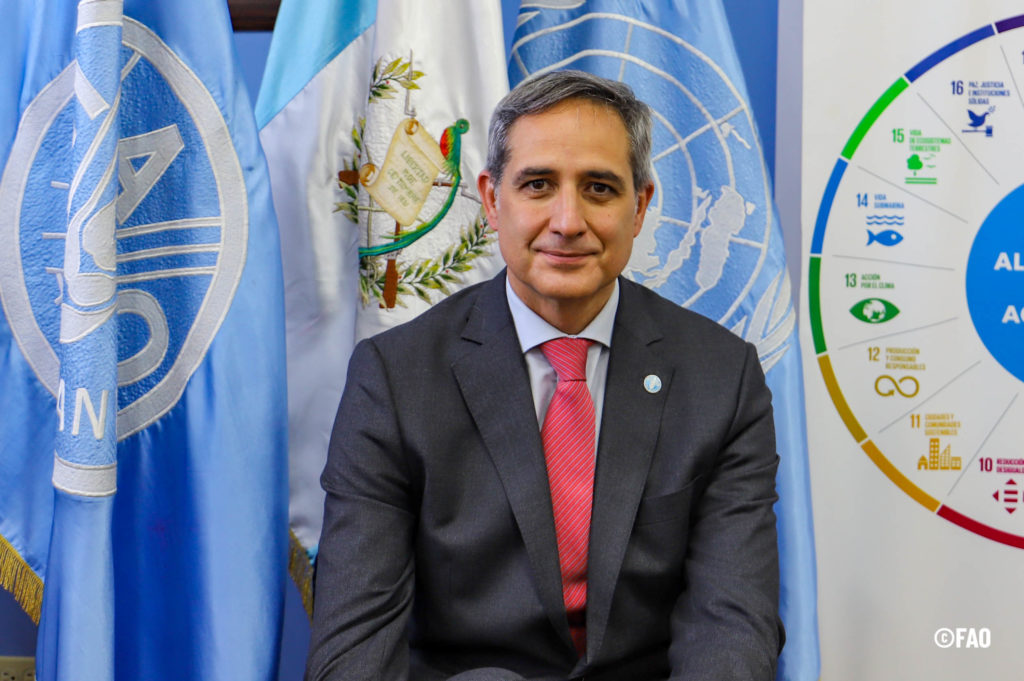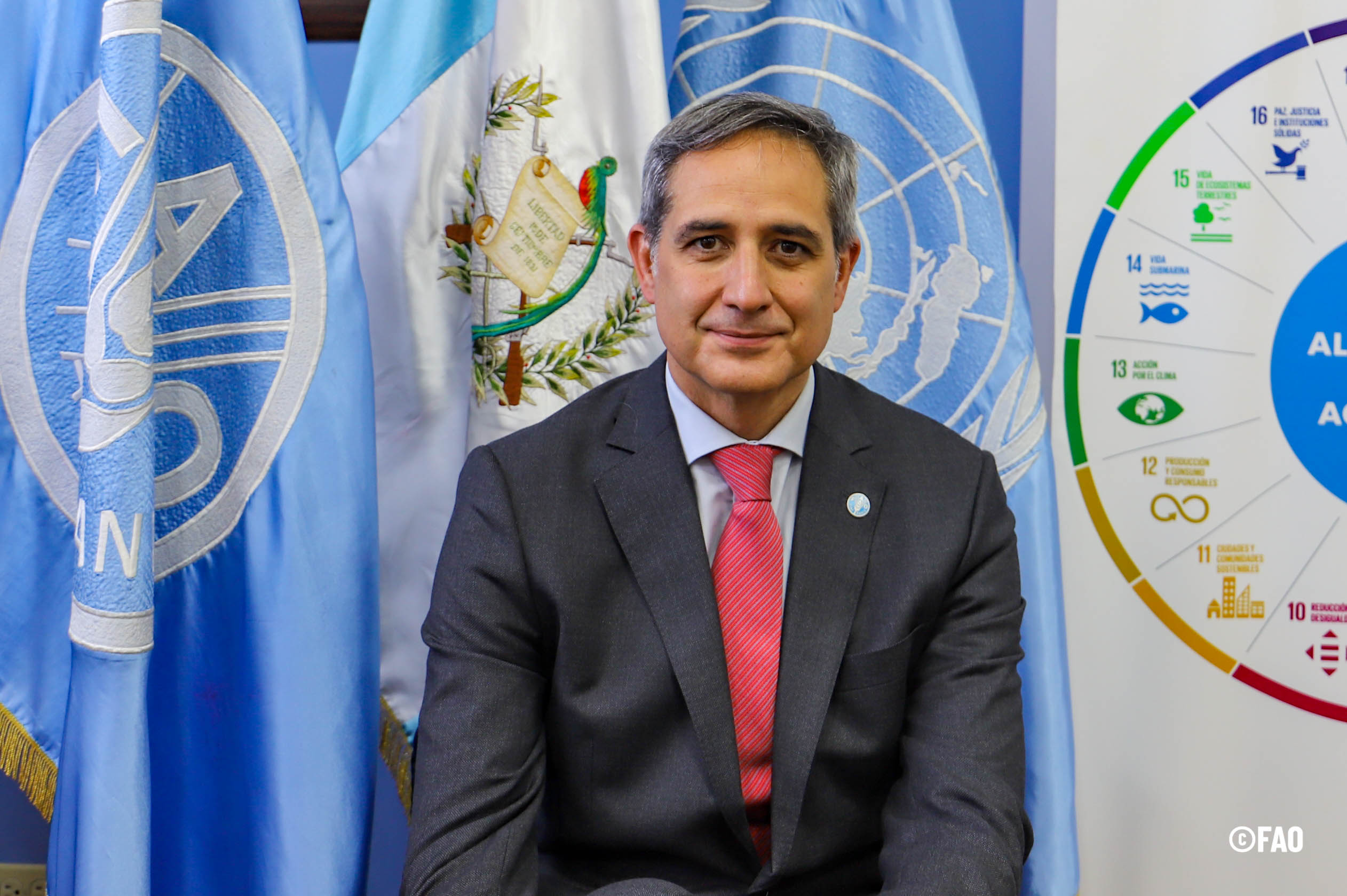For Mr. Ricardo Rapallo, FAO Representative in Guatemala, school feeding programmes should be included in any food and nutrition security strategy. And FAO can be a partner on that.
Paulo Beraldo
The Food and Agriculture Organization of the United Nations (FAO) can be a key player in supporting any government to develop a school feeding policy. This is what Mr. Ricardo Rapallo states, currently FAO Representative in Guatemala and within the Organization since 2004.
Before assuming the Representation of Guatemala, he was FAO Food Security Officer and worked closely with the Brazil-FAO International Cooperation in supporting various countries in the region in the design and implementation of school feeding programmes (SFP). And based on this experience, he does not have any doubt that it is viable for any country to have its school feeding policy and the positive results that this action can generate.
“From my experience, the SFP is an element that should be included in any food and nutrition security strategy of any country in the region.” Below is the full interview.

How can FAO support governments in the organization and implementation of school feeding policies? What are the possibilities for support?
FAO has shown different countries that it is an actor that can be fundamental for any government to develop its school feeding programme. For example, making them see the importance of feeding children properly, knowing that it is a human right and that the best investment a country can make is to adequately feed the students who will be the future and also to prepare future consumers. This is one of the areas that FAO can support.
The second is to “show that it is possible”, through pilot programmes and experiences. It is indeed feasible in any country to develop a model of school feeding programme, adapted to their reality, but including the principles of healthy eating, the incorporation of smallholder farmers, food and nutrition education, among other components.
Then, FAO can also help to generate evidence, data and figures that show how it is possible to bring to a national scale any SFP. We have worked with many countries in this area as well. FAO also shows that it can be a key player in generating the design of the programme, the policy, the law and the regulations that make it feasible to develop a programme on a national scale.
Then, there is a huge challenge in implementation, where FAO can support countries in finding instruments and mechanisms to make this policy possible. And finally, FAO can also support the monitoring, evaluation and analysis of the different SFP, identifying barriers, what has worked well, and what is not working, to provide feedback to the policy itself and improve its implementation.
And according to your experience, what can be improved in this sense of support that can come from FAO?
The SFPs that FAO is supporting are an enormous opportunity to improve nutrition, address all forms of malnutrition, boost local economies and generate well-informed consumers in the future. But of course, there are important challenges in the area of how to improve, for example, the instruments that facilitate the incorporation of smallholder farmers into the programme and the adaptation of menus to the conditions and characteristics of each country’s territory.
And also everything that is involved in adapting school facilities so that food can be prepared and children can eat properly. These are all areas that involve enormous challenges for countries and where FAO can continue working to find the most appropriate instruments for each of the programmes.
How important do you consider SFPs as strategies for food and nutrition security and for contributing to access to healthy diets?
From my point of view, from what we have been following from many countries for almost two decades in the LAC region, a school feeding programme is a fundamental element for any strategy that seeks to guarantee the Human Right to Food for all citizens of the country.
The SFP addresses a period of consumer construction where the future actors of the country’s development can be better fed. Therefore, a SFP is an element that should be included in any food and nutrition security strategy of any country in the region.
And in terms of local development, by promoting public purchases from smallholder farmers, how do you assess the development potential of this mechanism?
Public purchases from smallholder farmers, associations and cooperatives are essential to boost the local economy, to encourage the inclusion of smallholder farmers and associations in market logic and participation in the public and private markets. This is a fundamental element in this new generation of policies and programmes that provide food for students.
For example, the case of Guatemala, a country that through a public policy supported by FAO in its construction, today transfers up to 280 million dollars from the public budget to small-scale producers so that they can participate in the SFP and position their locally produced food through the efforts of families.
A programme that every year means 280 million dollars transferred to the local level. And, therefore, it becomes one of the most important social and productive policies in the programmatic framework and in the public budget of a country like Guatemala, which faces enormous challenges in terms of malnutrition in all its forms.
How to strengthen public procurement, to facilitate and to achieve even more changes and transformations in food systems?
The challenges are great. We have countries with school feeding laws passed almost 20 years ago that are still facing the challenge of incorporating more small farmers into the system and the programme. In the experience we have developed in Central America, there are areas of improvement in production, safety, and preparation in small farmers’ associations to be
linked to school feeding according to the menus that are designed in schools.
We are working in several countries on farmer registries. This is a fundamental area and we must work with the ministries, and government institutions, at departmental, state and municipal levels, with small producers. It is necessary to know who they are and what characteristics they must meet to be part of the programme.
It is essential to look at the instruments that state institutions need to incorporate smallholder families, providing them with training, technical assistance and, in some cases, financing so that they can promote organizational instruments that will allow them to participate more in the SFP. And also through productive mechanisms, such as the provision of safe water to be able to produce safe and healthy food.
There is a wide range of instruments that must be made available to family farmers. They are instruments that, by promoting their inclusion in the SFP, can be complementary to join local markets and supply their communities, municipalities and small and medium-sized cities. These are natural challenges that school feeding can accelerate the processes of inclusion and participation in public or private marketing chains.



